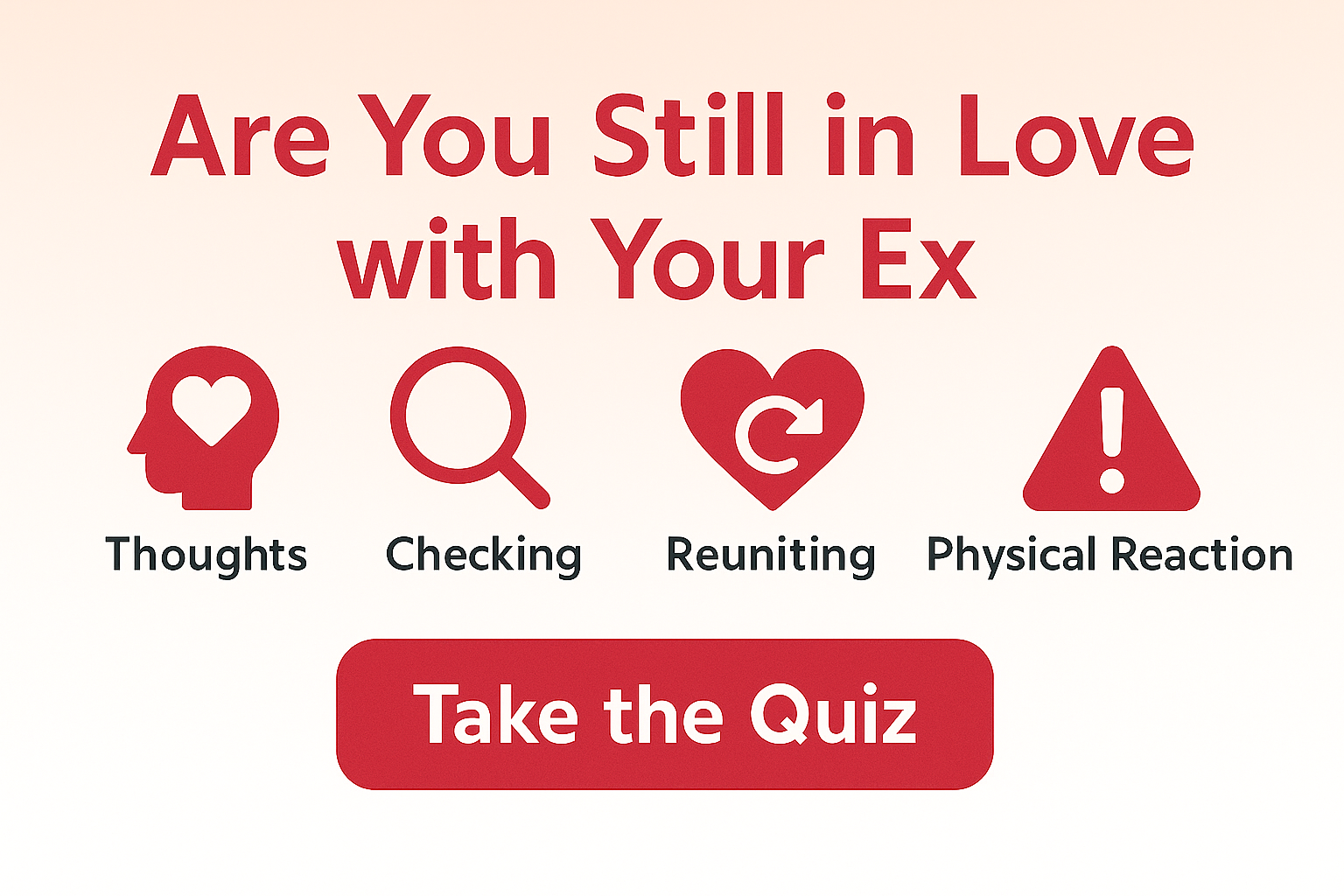You’re scrolling through social media when suddenly—there they are. Your ex, smiling in someone else’s photo. Your heart races when you think of your ex, pounding like you’ve just run a marathon. Your palms get sweaty, your breathing becomes shallow, and you feel those unwelcome butterflies when remembering your ex. Sound familiar? 😰

If you’ve ever wondered why your body betrays you like this, you’re not alone. That physical reaction to ex memories isn’t weakness, drama, or your imagination running wild. It’s your nervous system doing exactly what it’s designed to do—and there’s fascinating science behind why it happens. ✨

Your Body Remembers Everything 🧠
Here’s the thing that might surprise you: your body doesn’t distinguish between physical and emotional threats. When you see that photo, hear “your song” on the radio, or catch a whiff of their cologne on a stranger, your brain’s alarm system goes off just like it would if you were face-to-face with a charging bear.
This is what scientists call physiological reactivity—your body’s automatic, unconscious response to emotional triggers. It’s not something you can simply think your way out of because it happens below the level of conscious thought, in the deep, primitive parts of your brain that have kept humans alive for thousands of years.
Your autonomic nervous system has two main players in this drama. The sympathetic nervous system is like your body’s emergency response team. When it detects a threat (even an emotional one), it floods your system with stress hormones like adrenaline and cortisol. Your heart rate spikes, your muscles tense up, and suddenly you’re ready to fight, flee, or freeze.
Then there’s the parasympathetic nervous system, which is supposed to be the calming force that brings you back down. But sometimes, especially after intense emotional experiences like breakups, this system can overshoot and leave you feeling drained, nauseous, or emotionally flat.
The Chemistry of Connection
To understand why your ex still has this power over your body, we need to talk about the chemicals of love. When you were together, your brain was constantly bathing itself in a cocktail of bonding hormones and feel-good neurotransmitters.
Oxytocin, often called the “love hormone,” helped you feel connected and attached. Vasopressin strengthened those bonds even further. Dopamine made every text message feel like winning the lottery, while norepinephrine kept you alert and excited about this amazing person in your life.
Here’s where it gets tricky: these chemicals don’t just vanish the moment you break up. They linger in your system, creating a kind of emotional residue that makes you hypersensitive to anything that reminds you of your ex. It’s like your brain has filed everything related to them under “EXTREMELY IMPORTANT—PAY ATTENTION.”
Your amygdala, the brain’s emotional alarm center, has tagged all ex-related memories with high priority. This means that even the smallest reminder—a song, a street corner, a type of coffee—can trigger a full-body response faster than you can think “why am I reacting like this?”
When Your Body Takes Over
Maybe it happens when you’re having a perfectly normal day, and then boom—a memory hits you out of nowhere. Perhaps you’re walking past the restaurant where you had your first date, or your friend mentions they saw your ex at the grocery store. Suddenly, your body launches into full crisis mode. 😳
Your heart might start racing so fast you wonder if something’s medically wrong. Your hands could get clammy, your breathing shallow. You might wonder “why do I shake thinking of my ex” as tremors run through your body. Some people experience butterflies when remembering my ex—except these butterflies feel more like angry wasps. Others get hit with waves of nausea or that awful hollow feeling in their chest.
The intensity can range from mildly uncomfortable (like feeling slightly queasy when you drive past their neighborhood) to completely overwhelming (like having what feels suspiciously like a panic attack when you accidentally open an old text thread). 📱
If you’ve ever felt chest pain or dizziness during these episodes, please check with a doctor first to rule out any medical issues. But chances are, what you’re experiencing is your nervous system’s very normal, very human response to emotional stress. 💙
Two Different Paths Forward 🛤️
Not everyone handles these physical reactions the same way, and that’s completely normal. Understanding which category you fall into can help you figure out the best way to move forward.
Some people are what we might call “healing reactors.” If this sounds like you, you’ve probably noticed that these intense physical responses are gradually getting less frequent and less intense over time. When they do happen, you might use them as a kind of early warning system—a signal that you need to take a moment for some self-care or call a friend. You’re actively working on moving forward, whether that’s through therapy, exercise, creative projects, or building new relationships.
Then there are the “stuck reactors.” If this resonates with you, your physical reaction to ex memories might be staying just as intense or even getting worse as time goes on. They might be interfering with your daily life—making it hard to focus at work, disrupting your sleep, or causing you to avoid places and activities you used to enjoy. Often, these intense physical reactions come paired with mental loops of replaying the relationship over and over, or avoiding anything that might remind you of your ex. 🔄
Neither response is wrong or bad—they’re just different, and they point toward different healing strategies.
Tools That Actually Work 🛠️
The good news is that you don’t have to stay stuck in this cycle of physical overwhelm. There are proven techniques that can help you regain control when your heart races when you think of your ex. 💪
Grounding techniques can be lifesavers when you’re in the middle of an intense reaction. Try the 5-4-3-2-1 technique: name five things you can see, four things you can touch, three things you can hear, two things you can smell, and one thing you can taste. This simple exercise pulls your attention away from internal chaos and anchors you back in the present moment.
Breathing exercises might sound basic, but they’re incredibly powerful. When your sympathetic nervous system is in overdrive, controlled breathing is like hitting the reset button. Try box breathing: breathe in for four counts, hold for four, breathe out for four, hold for four. Repeat until you feel your heart rate starting to slow down.
Progressive muscle relaxation can help when you’re carrying tension throughout your body. Starting with your toes and working your way up, tense each muscle group for five seconds, then release. This technique not only helps you relax physically but also makes you more aware of where you hold stress in your body. This is especially helpful if you find yourself wondering “why do I shake thinking of my ex” – it teaches you to release that physical tension consciously. 😌
For the tech-savvy, heart rate variability training using biofeedback apps can teach you to literally see how your breathing affects your nervous system in real-time. It’s pretty amazing to watch your stress levels change on a screen as you practice different breathing techniques.
Mind-Body Approaches for Long-Term Healing 🧘♀️
While quick techniques can help in the moment, developing a regular mind-body practice can build your resilience over time.
Mindfulness meditation doesn’t mean you have to become a zen master. Even ten minutes a day of simply observing your thoughts and sensations without judgment can gradually reduce how reactive your amygdala becomes. Research shows that after about eight weeks of regular practice, people show measurably less brain reactivity to stressful triggers.
Gentle movement practices like yoga or tai chi combine breath awareness with physical movement in a way that specifically calms the nervous system. You don’t need to be flexible or coordinated—the goal is simply to reconnect with your body in a peaceful, non-threatening way.
Visualization can be surprisingly powerful. When a trigger hits, closing your eyes and imagining yourself in a safe, peaceful place (maybe a beach, a forest, or even your childhood bedroom) can activate your body’s relaxation response.

When It’s Time to Get Help
Sometimes, despite your best efforts, these physical reactions become too much to handle on your own. There’s no shame in recognizing when you need professional support—in fact, it takes wisdom and courage.
Consider reaching out to a therapist if you’re experiencing panic attacks in response to memories of your ex, if breakup-related thoughts are causing persistent insomnia or nightmares, if you’re dealing with chronic stomach problems that seem tied to relationship stress, or if you’ve started using alcohol or other substances to numb these intense reactions.
Therapists who specialize in approaches like Somatic Experiencing, EMDR, or Cognitive Behavioral Therapy can help you process difficult memories and literally rewire how your nervous system responds to triggers.
The Questions Everyone Asks
How long will this last? Most people find that the intensity starts decreasing within two to three months, especially if they’re actively practicing coping techniques. If you’re still experiencing intense reactions after six months, it might be worth talking to a professional.
Is this the same as having panic attacks? The symptoms can be similar, but ex-related reactions are usually less intense. If you’re experiencing overwhelming fear or a sense of impending doom, seek immediate support.
Could medication help? Sometimes. Beta-blockers can reduce heart rate spikes, and antidepressants might help with overall anxiety levels. Always work with a doctor to explore these options.
Why do I sometimes shake when memories hit? That’s your adrenal system in action—completely normal, though uncomfortable. Slow, deep breathing can help rebalance things.
How can I stop waking up in a panic about my ex? Create a calming bedtime routine: no screens for an hour before bed, maybe some journaling or gentle stretching, and consider keeping a glass of water by your bed for middle-of-the-night wake-ups.
Does exercise really help? Absolutely. Regular aerobic exercise is one of the best ways to regulate stress hormones and improve your overall resilience to emotional triggers.
Your Body Is Not Your Enemy
Here’s what I want you to remember: these intense physical reactions aren’t a sign that you’re weak, dramatic, or “not over it.” They’re proof of your capacity for deep connection and love. Your nervous system learned to associate your ex with safety, joy, and bonding—of course it’s going to take time to unlearn those associations.
Every racing heart, every sweaty palm, every flutter of anxiety is your body trying to protect you based on old information. With patience, the right tools, and sometimes professional support, you can teach your nervous system that you’re safe now, that you can handle these memories, and that your future holds connection and joy that doesn’t depend on this one person.
Healing isn’t linear, and it’s not always pretty. But your body’s intense reactions are not obstacles to overcome—they’re information to work with, signals to understand, and ultimately, proof of your deeply human capacity to love and be loved.
